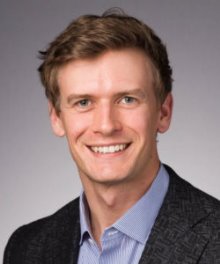
Find Your Range
Nate Tellis graduated from Bay in 2010 and attended McGill University in Montreal, where he studied physics and computer science. He was a staff scientist at UC Berkeley’s Department of Astronomy. Currently, he serves as the chief technology officer for Rocket CDL, a human resources technology startup he cofounded with fellow Bay alum James Robinson ’10; together they have developed a platform for recruiting and retention in high-turnover industries, including long-haul trucking and logistics. Nate was also recently appointed as a researcher to the Asteroid Institute, which is “dedicated to the discovery and deflection of asteroids.”
JW: So you studied physics and have worked in astronomy, but it seems like the connective thread through all of your path has really been the study of data.
NT: I will admit I’ve been sort of an opportunist of experiences. Data fluency is probably the thing I’ve done the most of, but I value range in work—a lot of people tend to specialize too early.
JW: I think it’s interesting that, of the people I know who have gone into the hard sciences, so much of what they end up doing is related to data and needing to code.
NT: One of things that was amusing and also terrible when I got to college is that I got really obsessive about physics [at Bay] and I decided to major in it, but going through high school, no one ever explained to me that if you want to build cool stuff, you became an engineer and not a physicist. And there are not that many discoveries left in physics that don’t require 1,000-person teams and 20 years, or at least that’s how it seemed to me. So I added computer science about halfway through. I would much rather build cool stuff sooner than wait until my 40s or 50s and be in the university system until then. But being able to code—I’m not sure how you’d be in any of the hard sciences without some programming ability, even just being able to read papers. So much of that is driven by data analytics now. It’s kind of a baseline skill.
JW: I think that hits some first-year science students hard, not understanding that coding was going to be a key skill for practicing science.
NT: My educational warpath idea is that obsessing over calculus in high school is probably not as important as giving kids a really good understanding of statistics. Because as long as you get the ideas of rate of change and integration, things building up over time, you’ve gotten the baseline concepts you need from calculus. But you can't even read the newspaper without knowing statistics.
JW: So you said that you were an opportunist, and it looks like your path has taken you to some interesting places. How did you and the cofounder of Rocket CDL identify this as a business idea? Because it seems you saw this coming before the pandemic even hit.
NT: My co-founder James [Bay Class of 2010!] did a coding bootcamp after college—which I think is the best way to get into the industry—and his first job was at a trucking software startup. They were trying to build a LinkedIn-style application for truckers, which is terrible, because truckers don’t care about that. The company went under. So then he started a company to build applicant tracking solutions. I joined him just to provide some data science background and advice early on. We then identified that the applicant tracking solution was a terrible idea, but the industry was hiring. The trucking industry spends about $25 billion a year on recruiting, so we built this solution that allows companies to use their drivers as mobile recruiting corps when they’re out on the road. There were a couple of little pivots, but we built an MVP [minimum viable product], went to a couple of trade shows, got a launch customer, and built it from there. We’re still in the very early stage, but we are rolling out the second version, expanding from referrals.
JW: How has the platform been received so far?
NT: Pretty well! I will say, I do almost no data science. In any small organization, you can’t have completely defined roles, [you need] the ability to just do a bunch of things–I do some graphic design, some full-stack development, sales, marketing. The product has been received well, though. We don’t have a ton of revenue yet, but at any point on an exponential curve, it doesn’t feel like you’re about to hit the inflection point, but one hopes that it’s always right around the corner.
JW: With the supply chain situation being what it is, is there an opportunity for a business like yours to change how hiring and employee incentives are handled?
NW: There’s a big shortage of drivers in the market, and that is part of what’s been challenging supply chains so much. More generally, companies need to adapt in order to hire and retain employees, and I think that the tech world and white-collar world has already adopted a lot of cool systems for this, but it hasn’t really entered [vocational] industries as much. Our platform is for incentives and retention-program management for higher-turnover industries— trucking for now, but we are planning to move into nursing and other high-turnover industries.
JW: So you also studied Japanese. Did that start in college?
NT: No, it started because I was a total weeaboo* in high school, probably well before high school. I did a homestay [in Japan] when I was 15. I went with another kid from Bay, Jonathan, and I just really liked it there. I always kept it in the back of my mind. [After college] I’d been studying some Japanese, so when I went back, I did full-time language instruction, and I was working at Berkeley still on astronomy stuff and had a couple of other gigs. I was a model there for a while—that was fun and also really good language practice, because you just have to sit there and talk to people for hours while they take photos.
JW: So if you were to give a morning meeting talk in the near future, what would it be on?
NT: Probably range. This is something I’ve been thinking about for a while. The 10,000-hours meme—that you become an expert after a certain amount of time in something—that has always felt like [wrong] to me. A lot of the really passionate and interesting people who were around when I was growing up had clearly had a lot of interesting chapters in their lives, and those had all fed back into interesting careers, varied networks, varied skill sets. A family friend who I have a lot of respect for, he’d had an interesting career [and] ended up, at the age of 65 or 70, deciding that the only way he was going to accelerate his career was if he became better at acting. So he went and got an acting degree, and he said it really helped in being able to present himself. So I see a lot of advantages in exploring different avenues. That would probably be the thing I would talk about.
I’d been interested in that for a while and then someone recommended a book called Range which it turns out is pretty much exactly about that. The whole idea that you have to decide what to major in in college and that that’s somehow going to be relevant to the future career that you have, I think, is kind of ridiculous. Building meta skills seems so much more important, although that’s a little harder to focus on. There are a lot of people like me who thought, I’m going to study physics, or whatever, and then realized later down the road this only trains me to do one thing.
In general, knowledge is very easy to come by now. If you’re motivated enough, you could go to MIT without going to MIT. All of the information is there. So, I feel like teaching people what they want to learn is more important.
JW: Yes, teaching students those meta skills and the knowledge that there’s range out there and they can go find it is paramount in education now.
NT: Both in roles I’ve joined and when bringing someone onto our team, whether you actually know how to do the thing you need to do is not that important. Let me qualify a bit—being able to code, there is a certain skill set and that requires a certain amount of grinding. But knowing programming concepts, you can pick up any language without too much work. I felt like in university I ended up having to teach myself. At the end of the day, you’re the arbiter of your own learning. And that continues onward, so the single most important skill you can learn is [how to] learn what you need to do—the ability to find the bottlenecks and become productive and accelerate the learning.
JW: Do you have any favorite things to recommend—books, podcasts?
NT: Range**, that’s a good book to read at almost any age. Also Thinking Fast and Slow by Daniel Kahneman. I think behavioral science is at the core of a lot of what matters. A friend of mine said, ”Once you’ve read enough behavioral science, you just can’t get mad at anyone anymore.” You know, a dog bites you, and you’re not angry at the dog; you’re just like ‘Oh, it’s a shame that the dog had such a life that it would do this.’ I think to a large extent, the same applies to people and situations and the world.
I really like Sam Harris’s podcast and Tim Ferris’s [podcast] interviews with Naval Ravikant. Naval is one of the founders of AngelList, and he has some really good advice about how to think about your skill development, your personal development, and your career development. It’s a very humble and honest approach to things without being overly reliant on jargon. And anyone who follows him can ignore all the crypto stuff—unless they like that.
*Weeaboo: a Western person who is obsessed with Japanese culture.
**Range: Why Generalists Triumph in a Specialized World by Saul Epstein
Photo courtesy of B612





.jpeg&command_2=resize&height_2=85)










